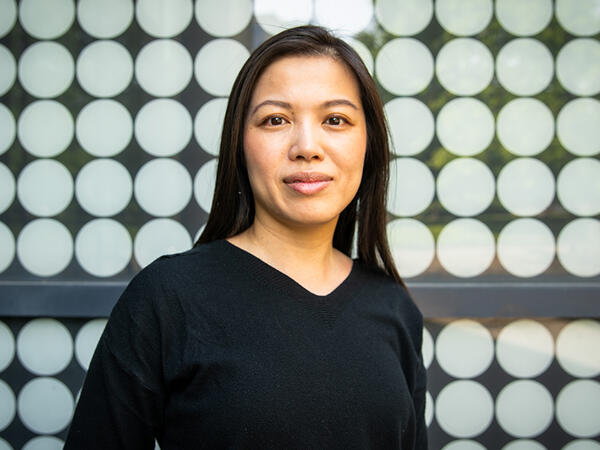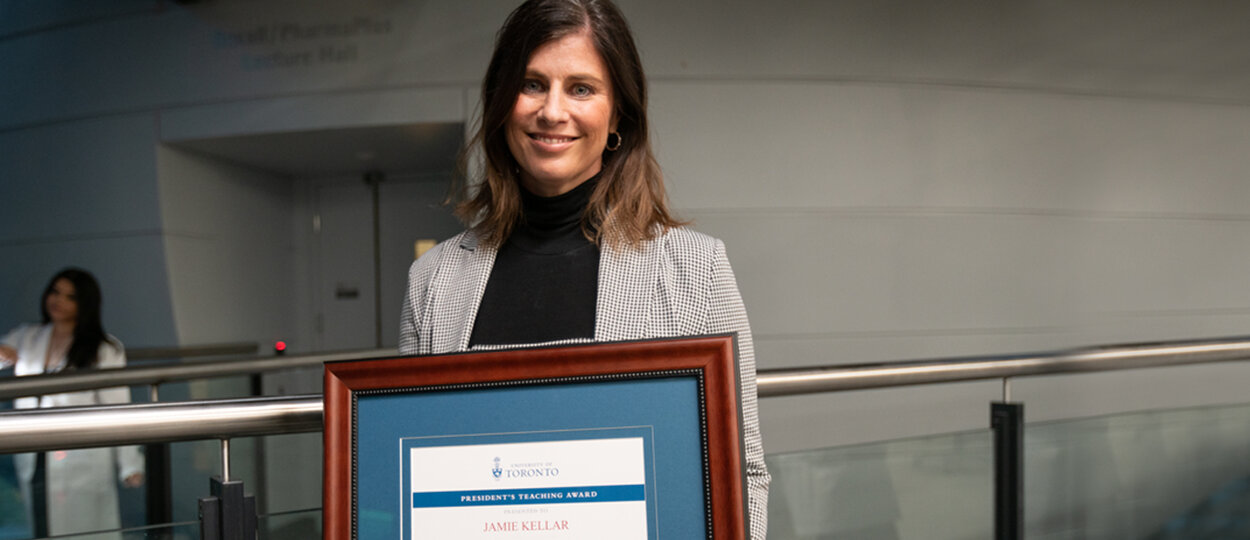Jamie Kellar, Associate Dean, Academic, has helped grow mental health curriculum and student opportunities at Leslie Dan Faculty of Pharmacy
Jamie Kellar understands just how much education can change a life. As Associate Dean, Academic, at U of T’s Leslie Dan Faculty of Pharmacy as well as a PhD candidate, education and teaching have become the centre of her career. But she hasn’t taken the pursuit of higher education for granted.
“Education has opened doors and allowed me to change the trajectory of my own life, but also the lives of people who cross our paths,” she says. “I’ve always been extremely grateful for my education, and I think that spills over into my teaching.”
Kellar grew up in an agricultural community near Wasaga Beach, Ontario. At the time she went to high school, many of the students did not attend university after graduating, and no one from her immediate or extended family had been to university. But her parents always encouraged her to pursue higher education and see what opportunities might follow.
“My parents were believers that education gave you opportunities,” she says. “We could always choose to come home if we wanted, but if we were given an education, we would have options and could decide to explore those opportunities.”
Kellar had worked in the local community pharmacy throughout high school and was interested in health sciences broadly, so she first studied kinesiology at the University of Guelph. She then decided to pursue a Bachelor of Science in Pharmacy at U of T, based largely on her experience working in the community pharmacy in Wasaga Beach.
She earned her degree in 2004, working in hospital pharmacy throughout her education and after graduation. She then became interested in specializing in psychiatry and practiced at Ontario Shores Centre for Mental Health Sciences in Whitby for seven years, while also working toward her Doctor of Pharmacy (PharmD) degree.
Kellar then became a Clinician Educator at the Leslie Dan Faculty of Pharmacy, a role that included both teaching at the Faculty and an advanced practice pharmacist role at the Centre for Addiction and Mental Health. When she had the opportunity to design a new mental health course for the PharmD program and take on more teaching at the Faculty, she discovered that she wanted to focus her career on education.
“The students seemed to connect with the material and how it was delivered, and interest in the curriculum grew. We’ve been able to really bring mental health into the mainstream for pharmacy education.”
“I really liked teaching and interacting with students, and I liked going to their events and creating opportunities for them to be engaged with mental health,” she says. “The students seemed to connect with the material and how it was delivered, and interest in the curriculum grew. We’ve been able to really bring mental health into the mainstream for pharmacy education.”
Engaging content helps grow interest in mental health curriculum
Kellar focuses on building lived experience of mental illness into course learning. She regularly invites guest speakers to lectures and has organized movie nights featuring films related to mental illness followed by a moderated discussion. Students often comment on the value and impact of the guest speakers, and mental health courses and rotations are typically in high demand.
“Prior to designing new courses dedicated entirely to mental health therapeutics in the PharmD curriculum, there didn’t seem to be a significant interest in mental health as an area of practice. The previous BScPhm curriculum didn’t have as much time dedicated to mental health content, and stigma impacted students’ perceptions,” says Kellar. “I wanted to create opportunities to engage students in the science of the material and help students understand that a chronic mental illness has a significant impact on quality of life. As health care providers, we can make a huge difference through medication management but also through advocacy and support.”
Kellar has received several awards recognizing her commitment to teaching and focus on student engagement, most recently the 2021 President’s Teaching Award, the most prestigious teaching award at U of T.
PhD research helps inform approach to education and teaching
While Kellar was providing education to learners at the Leslie Dan Faculty of Pharmacy, she was also a learner herself, pursuing a PhD at the School of Health Professions Education at Maastricht University in the Netherlands. Her dissertation, which she will defend this fall, focuses on the discourse of professional identity in pharmacy and has required her to become an expert in an entirely different field than her previous work.
Being both a teacher and a learner gave her a renewed appreciation for the challenges that many learners face while earning their degrees, including the challenges of balancing academic and other work, with family and caregiving priorities. But it also gave her new opportunities, including becoming a research fellow at the Wilson Centre, a research centre focused on health professional education affiliated with U of T’s Temerty Faculty of Medicine.
“Through my PhD, I’ve learned a lot about educational design and assessment, and I became connected with large research networks,” says Kellar. “All of these doors opened for me, and it certainly allowed me to explore things in ways that I couldn’t before, which has impacted my own teaching and approach to education.”
In November 2020, Kellar also took on the role of Associate Dean, Academic, at the Leslie Dan Faculty of Pharmacy. One key priority will be to lead the PharmD curriculum redesign along with Natalie Crown, Director of the Doctor or Pharmacy program.
“I’ll be able to take my experiences in pharmacy, education, and research-based training to work with our faculty to redesign curriculum that trains pharmacists for the future,” she says. “I’m excited to work with all parts of our faculty to create an innovative, modernized pharmacy curriculum.”
Kellar has always highly valued her education, which is one reason that providing high quality education to the next generation of pharmacists has been a priority for her.
“Education is a tool that opens doors, and the doors are often different for everyone. Being able to provide education is tremendous, and it gives people so many opportunities,” she says. “I feel so privileged to have been educated, and now I’m looking forward to developing and delivering education programs at a pretty phenomenal institution.”
More News
Image

Grad to Watch: Jackie Fule Liu’s research focuses on better outcomes for diabetes patients
A recent PhD graduate, Jackie Fule Liu combines hands-on skill and big-picture thinking to help tackle diabetes care challenges.
Read More
Image

U of T community members recognized with Order of Canada
Congratulations to Dean Emeritus and Professor K. Wayne Hindmarsh on his appointment.
Read More
Image

Welcoming Ivy Lam as Academic Lead in Climate, Health & Sustainable Care
Assistant Professor Lam will guide the Leslie Dan Faculty of Pharmacy's efforts to embed environmental sustainability across the Faculty.
Read More
